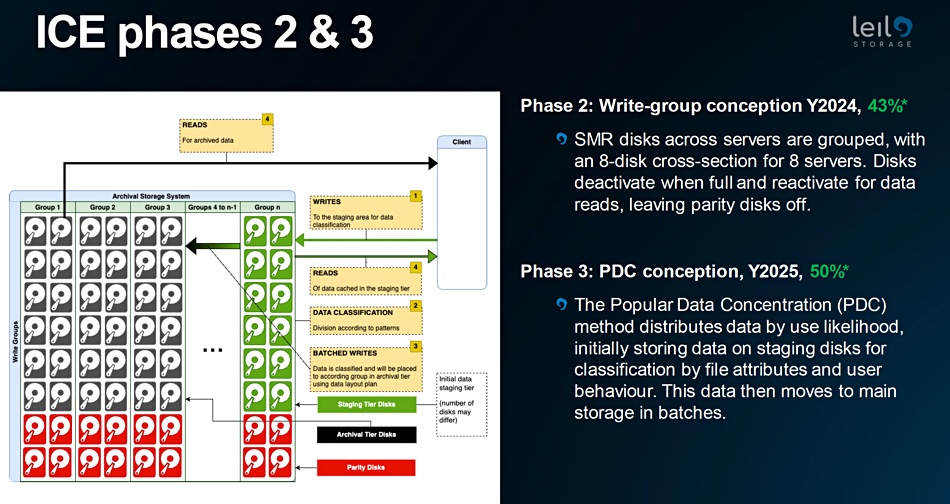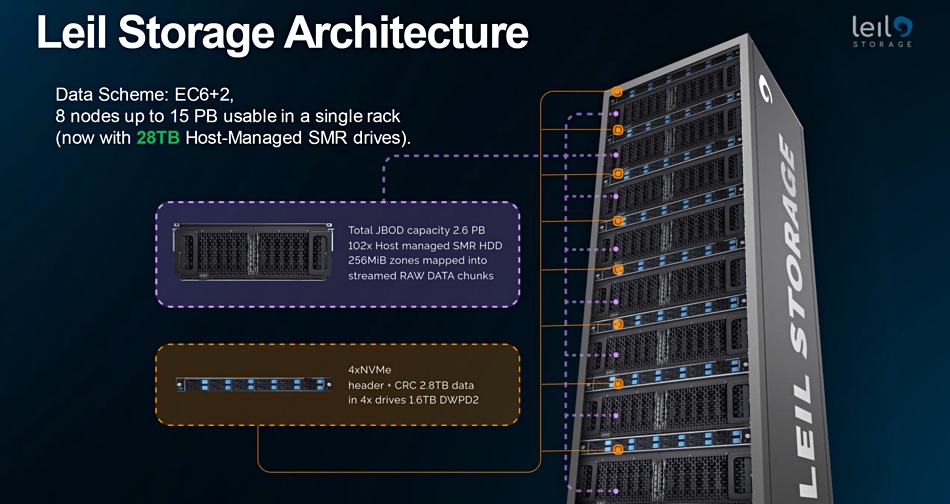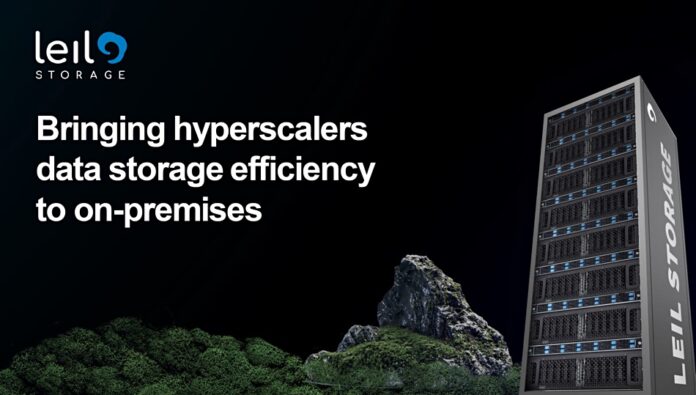Leil Storage, a startup owned by Estonian storage systems builder DIAWAY, is extending its sustainability credentials in the second half of this year by introducing much lower power backup and archiving systems.
Earlier this year, Leil Storage introduced backup and archiving platforms benefiting from the operational advantages offered by Host-Managed Shingled Magnetic Recording (HM-SMR) drives. A Leil pitch says: “At Leil Storage, we combined development expertise from Google with support from Western Digital and created a platform that allows more people to store more data at a lower cost while using less energy and making the world a greener place.”

HM-SMR was previously a format mainly used by hyperscalers. Leil has now developed it to target enterprises and service providers that want to benefit from a lower energy consumption, a lower cost per terabyte, and better performance when compared to traditional legacy storage systems. HM-SMR is better, Leil says, for sequential workloads, not random IO.
On the Leil Backup and Leil Archive systems, CEO Aleksandr Ragel told this week’s IT Press Tour in Rome: “We are bringing hyperscaler data storage to on-premises environments. We focus on data storage that is greener than the competition, and which uses the latest technologies to safeguard the data and protect investments.”
On launch, the systems’ HM-SMR disks were promising 18 percent lower power usage when compared to non-SMR drives. In the second half, 2024, the same systems – which come with Leil’s software – will be equipped with the Power Disable feature, which promises to slash storage power draw by “25 percent or more” in what Leil is calling its Infinite Cold Engine (ICE), a variation of Massive Array of Idle Drives (MAID) technology, and Arctic Forest products. ICE is phased:
- Phase 1: HM-SMR support, 18 percent total energy savings
- Phase 2: Write-group conception 2024, 43 percent projected total energy savings
- Phase 3: Popular Data Concentration (PDC), 2025, 50 percent projected total energy savings
- Phase 4: AI-driven background service, 2026, 70 percent projected total energy savings

The Arctic Forest Concept has an additional immutability layer, built on the foundation of SaunaFS Copy-on-Write snapshots, to enhance the existing immutability features, presenting, Ragel says, a groundbreaking and exclusive market offering.
The AI-driven background service will:
- Gather data on power use, user behavior, and system changes for energy savings
- Test data classification parameters through simulation and experimenting with combinations
- Compare actual versus simulated pre-installation energy use and provide recommendations to align with theoretical outcomes
Leil Storage is a commercial closed source product that extends the open source, POSIX-compliant SaunaFS distributed file system with proprietary green features. Leil storage effectively equals SaunaFS plus ICE plus the Arctic Forest Concept.

Its storage architecture is rack-based with eight nodes (JBODs) providing 15 PB usable capacity in a rack with a 6+2 erasure coding scheme. Total JBOD capacity is 2.6 PB with 102 x 28 TB HM-SMR drives (Western Digital UltraSMR). These have 256 MiB zones mapped into streamed raw data chunks. A node has 4 x NVMe SSDs, each with a 1.6 TB Drive Writes per Day rating.
Leil says its systems are already backup and archiving targets with cloud data management players including Veeam, Acronis, Cohesity, Veritas, which is in-progress, and Rubrik, which are all technology partners of the company.
Ragel identifies competing technologies as tape libraries, high-cap HDD arrays, object storage systems (using the high-cap drives), and general software-defined storage when used for nearline, backup target, and archival storage. He says hyperscalers such as Dropbox and Wasabi uses HM-SMR drives. The Ceph and Btrfs storage software products support HM-SMR.
Ragel maintains that HM-SMR was always equipped with the technology to deliver better and greener performance, but, until now, the software wasn’t being developed to deliver it outside of hyperscalers. Now Leil is making the tech available for general enterprise use.
Leil Storage’s pricing scheme is pay upfront for the capacity you need (including hardware, software, and support), with options for a three or five-year term. For SaunaFS, customers choose from monthly, yearly, or one-time payments for the software license and support, based on raw capacity, also available for three or five-year terms. Hardware is an option to be sold separately if needed.
“We are the bread for large-scale data storage, not the butter, not the caviar. We provide simple products, not monstrous ‘everything for everyone’ systems that cost more,” added Ragel. “We may go into butter space at some point.”
Bootnote
Supplier Disk Archive Corporation has spin-down disk technology in its product.








